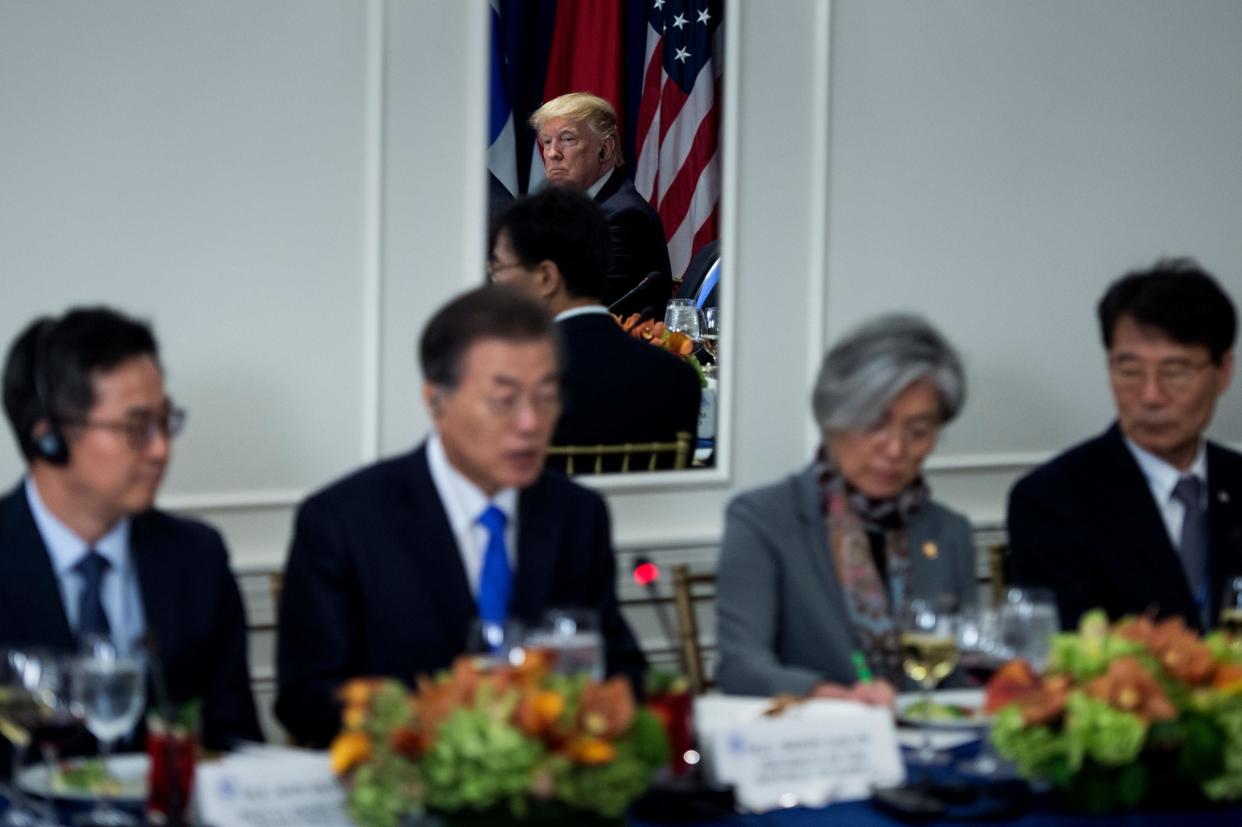North Korea: Trump and Kim Jong-un are ‘raising expectations for further escalation', says foreign policy expert

Donald Trump and Kim Jong-un have escalated the pitch of their sabre-rattling, attacking one another on personal terms with the fate of an entire region in the balance and foreign policy experts warning it is likely to lead to more than just talk.
In a rare release attributed to Mr Kim, the North Korean leader called Mr Trump a “dotard” and a “frightened dog” for his threats of annihilation during a speech at the United Nations General Assembly. Mr Trump, never one to pull punches, responded the next morning by calling Mr Kim a “madman”, and threatening to test the Korean leader “like never before”.
“I think this will lead to something in the coming days,” Gi-wook Shin, the director of the Walter H Shorenstein Asia-Pacific Research Centre at Stanford University, told The Independent, saying that the statements now put pressure on Mr Kim to put his money where his mouth is. “That’s why I’m concerned, that it might be more than an escalation of rhetoric. There may be escalation of expectations."
The two world leaders were far from friendly in their verbal crossfire this week.
“I will surely and definitely tame the mentally deranged US dotard with fire,” Mr Kim said, using an arcane term for a senile or weak-minded elderly person.
“Kim Jong Un of North Korea, who is obviously a madman who doesn’t mind starving or killing his people, will be tested like never before!” Mr Trump shot back on Twitter.
Behind the sparring between a baby boomer American and a millennial North Korean is escalating concern in the western world about North Korea’s increasingly threatening missile and nuclear weapons programme. After the President’s UN remarks, Mr Kim and his regime threatened retaliation at the “highest level”.
“It could be the most powerful detonation of an H-bomb in the Pacific,” North Korean foreign minister Ri Yong-ho, who is scheduled to address the UN over the weekend, said of a potential detonation in the Pacific. “We have no idea about what actions could be taken as it will be ordered by leader Kim Jong-un.”
Throughout the week, Mr Trump met with the leaders of South Korea and Japan to discuss the crisis, including a meeting between the President and South Koran President Moon Jae-in on Friday in which they reaffirmed their commitments to North Korean sanctions, and agreed to continue pressuring the country to give up its nuclear weapons ambitions.
The North Korean threats rattled the financial markets in the Asia-Pacific region, leading to a drop in stocks that day. In Japan, the government’s defence minister told his country to brace for the potential launch of a nuclear-armed North Korean missile. Analysts said that the results could be devastating if something went wrong with that missile.
“We cannot deny the possibility it may fly over our country,” said Itsunori Onodera, the Japanese defence minister.
North Korea’s testing of nuclear weapons and its intercontinental ballistic missile (ICBM) systems has raised concern in the region over the past several months, and the US and its allies have retaliated in tangible terms with increasingly strict sanctions.
After North Korea’s sixth and most powerful nuclear test earlier in the month – the first such test during Mr Trump’s presidency – and after the repeated ICBM tests that indicate North Korea may soon be able to launch a missile that could hit the US mainland, the US and the UN responded with strict sanctions that further isolate Pyongyang from global markets.
China, one of North Korea’s most important allies in the region, is honouring those sanctions as well. While world leaders met in New York for the UN General Assembly, reports indicated that the Chinese central bank had sent a letter to banks in the country, warning of potential reputation or financial setbacks if they did not begin cutting ties to North Korean sources targeted by the sanctions.
Mr Trump, at nearly the same time as those reports surfaced, also signed an executive order implementing stricter sanctions that bans ships and aircraft from visiting the US within 180 days of going to North Korea.
“Foreign financial institutions must choose between doing business with the United States or facilitating trade with North Korea or its designated supporters,” the White House said in a statement.
Mr Kim’s personal response is believed to have been the first time in three generations of the Kim dynasty that a North Korean leader has read out a statement to the international community in their own name. The South Koran unification ministry says that neither Mr Kim’s father, nor his grandfather – who founded the country – issued similar statements during their rule.
The North Korean leader said in the statement that Mr Trump’s harsh rhetoric had convinced him to break from that tradition.
“Now that Trump has denied the existence of and insulted me and my country in front of the eyes of the world and made the most ferocious declaration of a war in history that he would destroy [North Korea], we will consider with seriousness exercising of a corresponding, highest level of hard-line countermeasure in history,” Mr Kim said.

 Yahoo News
Yahoo News 
